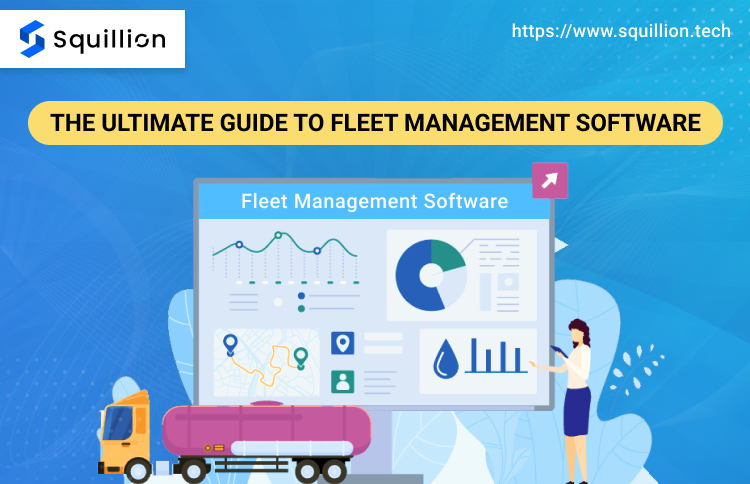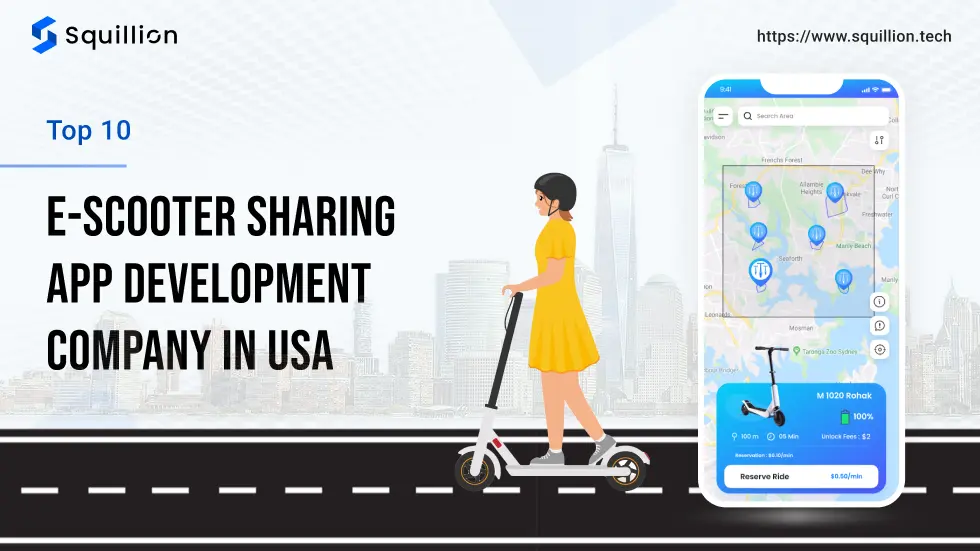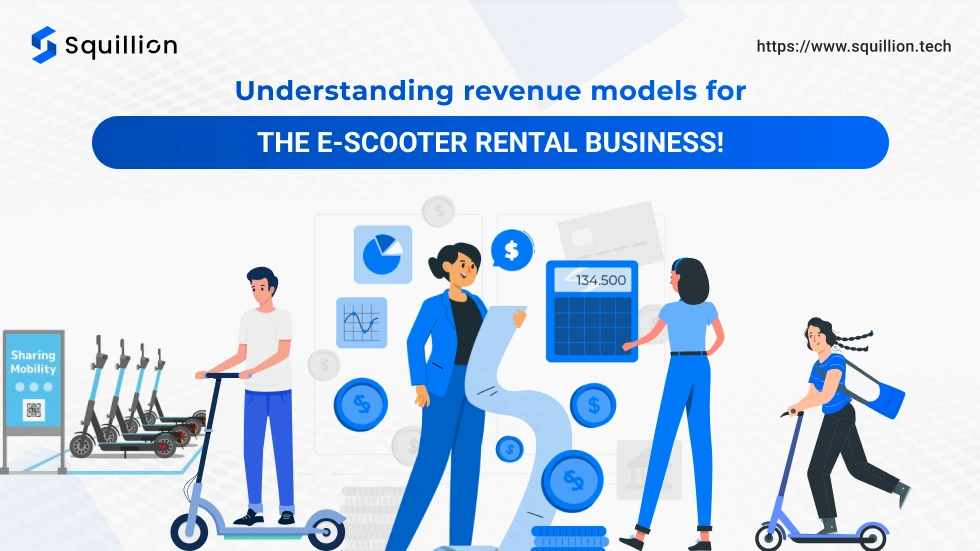In the bustling world of transportation and logistics, did you know that the global fleet management market is expected to reach a staggering $34 billion by 2025?
That’s a testament to the meteoric rise of Fleet Management Software. This tool has emerged as the linchpin in modern fleet operations.
From small businesses to sprawling enterprises, Fleet Management Software has become an indispensable asset, transforming the way fleets are managed, monitored, and optimized.
It’s like the GPS of your entire operation, guiding you through the complex maze of fleet management with precision and ease.
If you’re considering developing or implementing a fleet management system into your business operations, this guide is for you. We’ll explore the complete fronts and backs of this game-changing solution.
So, let’s start with understanding what Fleet Management Software is and why it’s become a must-have in modern fleet operations.
What is Fleet Management Software?
Fleet management software is a technological solution that helps businesses track, monitor, and manage vehicles within a fleet. It provides real-time insights, control, and automation of various tasks related to fleet management.
Think of it as a virtual command center that gives you a bird’s-eye view of your entire operation
How Does These Fleet Maintenance Softwares Work?
Fleet management software works by collecting data from various sources, such as GPS devices, fuel cards, and vehicle sensors. It then processes this data to provide actionable insights and automation. Here’s a step-by-step breakdown:
- Data Collection: Information is gathered from vehicles, drivers, and external sources.
- Data Processing: The software analyzes the data to identify trends, issues, and opportunities.
- Actionable Insights: It provides real-time reports, alerts, and recommendations to help you make informed decisions.
- Automation: Routine tasks, such as maintenance scheduling and compliance checks, are automated to save time and reduce errors.
- Integration: The software can be incorporated with other business systems, such as accounting and HR, to provide a seamless operation.
Some Industry-Wise Use Case Examples
Understanding fleet management software is one thing, but seeing how it’s implemented across various industries brings it to life. Here’s how different sectors leverage this technology:
Logistics and Transportation: In this industry, fleet management software helps in route optimization, fuel efficiency, and real-time tracking of shipments. For example, a logistics company can use the software to ensure timely deliveries and minimize fuel consumption.
Emergency Services: Police, fire, and ambulance services use fleet management software to coordinate emergency responses. It helps in dispatching the nearest vehicles and provides real-time updates on their location and status.
Construction: Construction companies use fleet management software to manage heavy equipment and ensure timely maintenance. It helps in scheduling equipment usage, tracking utilization, and preventing breakdowns.
Public Transportation: Public bus and train services use fleet management software to manage schedules, monitor performance, and enhance passenger experience. For example, a city’s public transportation system can use the software to provide real-time updates to passengers about bus arrivals.
Healthcare: Medical transportation services use fleet management software to coordinate patient pickups and deliveries. It ensures that critical medical supplies and patients are transported efficiently and safely
Retail and E-Commerce: Retailers and e-commerce platforms use fleet management software to manage deliveries and returns. It helps optimize delivery routes, reduce delivery times, and enhance customer satisfaction
Government and Municipal Services: Government agencies use fleet management software to manage various public service vehicles, such as waste collection trucks and road maintenance equipment. It helps in planning routes, scheduling maintenance, and ensuring compliance with regulations.
6 Benefits of Fleet Management Software
Fleet management software is transforming the way businesses manage their vehicles. Here’s a closer look at the benefits, each grounded in real-world facts:
- Managing Your Drivers: Approximately 20% of fleet accidents can be attributed to poor driver behavior. Fleet management software allows you to monitor driving habits, provide feedback, and ensure compliance with safety regulations, thereby reducing the likelihood of accidents and enhancing overall safety.
- Reporting and Analytics: With fuel costs accounting for nearly 30% of total fleet operating costs, a 10-15% reduction can translate to significant savings. Fleet management software provides comprehensive reports and analytics, enabling you to analyze fuel consumption and make data-driven decisions to cut costs.
- Compliance Improvement: Non-compliance penalties can range from $1,000 to $10,000 per violation. Fleet management software automates tracking and reporting, ensuring adherence to emission standards, driving hours, and other regulations, helping you avoid these costly fines and protect your company’s reputation.
- Reduced Spreadsheets: Administrative tasks can consume up to 40% of office staff time. By centralizing all data in one platform, fleet management software streamlines processes, eliminates manual spreadsheets, and frees up beneficial time for more strategic tasks.
- Health and Safety: Accident-related costs can be reduced by up to 30% with proper safety measures. Fleet management software allows you to observe and enforce safety protocols, track vehicle maintenance, and create a culture of safety within your fleet, protecting both your employees and your bottom line.
- Save Money: Efficient fleet management can lead to overall cost savings of 10-20%. By optimizing routes, reducing fuel consumption, managing maintenance efficiently, and minimizing idle time, fleet management software helps you achieve these savings, positively impacting your profits.
15 Features of Fleet Management Software
Fleet management software is like a Swiss Army knife, packed with features that cater to every aspect of fleet management. These features, powered by the latest technologies, transform fleet management from a manual, reactive process into a proactive, intelligent operation.
They enable fleet managers to stay ahead of the curve, making informed decisions that drive efficiency, safety, and profitability. Here’s what you can expect:
- Fuel Tracking and Management: Utilizing IoT sensors and machine learning algorithms, this feature monitors fuel consumption patterns, identifies inefficiencies, and provides actionable insights to optimize fuel usage.
- GPS Tracking and Telematics: By leveraging Global Positioning System (GPS) technology and telematics, you can track vehicles in real-time, analyze routes, and ensure timely deliveries. It’s like having a virtual co-pilot for every vehicle.
- Maintenance Scheduling and Alerts: This feature ensures that vehicles are maintained at optimal intervals through predictive analytics and automated scheduling. It uses historical data to predict when maintenance is due, reducing downtime and unexpected breakdowns.
- Driver Performance Monitoring and Reporting: Integrating biometric sensors and AI-driven analytics, this feature assesses driver behavior, identifies risky practices, and offers coaching to improve safety and efficiency.
- Work Order Management: By connecting with ERP systems and utilizing cloud-based platforms, work order management streamlines tasks, schedules jobs, and ensures that resources are allocated effectively.
- Life Cycle Cost Analysis: Using data analytics and financial modeling, this feature provides a detailed analysis of each vehicle’s total cost of ownership (TCO), helping in making informed purchasing and retirement decisions.
- Charge Management Software: For electric fleets, charge management software integrates with smart charging infrastructure, managing charging schedules and optimizing energy consumption based on real-time grid data.
- Mobile App: Leveraging responsive design and cross-platform compatibility, the mobile app ensures fleet managers can access critical data and functionalities from any device.
- Fleet Utilization and Optimization: Utilizing big data analytics and optimization algorithms, this feature analyzes vehicle usage patterns, identifies underutilized assets, and recommends optimal allocation to maximize ROI.
- Integration with Existing Systems: Through APIs and middleware, fleet management software can seamlessly integrate with existing enterprise systems like HR, Finance, and CRM, creating a unified platform for holistic fleet management.
- Security and Compliance: Implementing robust encryption and cybersecurity protocols, the software ensures data integrity and compliance with regulatory standards such as HIPAA and GDPR.
- Customizable Dashboards and Reporting: With Business Intelligence (BI) tools and customizable dashboards, fleet managers can create tailored reports, visualize key metrics, and make data-driven decisions.
- Augmented Reality (AR) Assistance: For maintenance and training, AR can provide virtual assistance, guiding technicians through complex repairs or offering virtual training modules for drivers.
- Machine Learning for Predictive Analysis: Machine learning models analyze historical data to predict future trends, such as potential breakdowns or optimal replacement times, allowing for proactive decision-making.
- Blockchain for Transparency and Security: Implementing blockchain technology ensures transparent and tamper-proof record-keeping, enhancing trust and accountability within the fleet ecosystem.
For Whom Are Fleet Maintenance Softwares Useful?
Fleet management software is a versatile tool that caters to various roles within an organization, each finding unique value in its implementation:
- Fleet Managers: Fleet managers utilize the software to oversee the entire fleet, from vehicle tracking to maintenance scheduling. For example, by using real-time GPS tracking, they can optimize routes, enhance efficiency, and reduce fuel costs.
- Compliance Managers: Compliance managers leverage the software to ensure adherence to legal regulations and standards. By automating compliance tracking, they reduce the risk of legal issues, ensuring that the fleet operates within the bounds of the law.
- Dispatcher: Dispatchers coordinate routes, schedules, and driver assignments through the software. For instance, by analyzing traffic patterns and weather conditions, they can dynamically adjust routes, improving delivery times and customer satisfaction.
- Maintenance Managers: Maintenance managers schedule regular maintenance, inspections, and repairs using the software. This proactive approach extends vehicle lifespan, reduces downtime, and prevents unexpected repair costs, as seen in the timely detection of wear and tear.
- Safety Managers: Safety managers monitor driver behavior, vehicle conditions, and safety compliance with the software. By implementing features like driver performance monitoring, they foster a safety culture, reducing accidents and protecting assets.
- Accounting: Accounting professionals manage fleet-related finances through the software, including fuel costs and budgeting. By integrating with financial systems, they streamline budgeting and financial planning, ensuring cost-effective operations, as evidenced by accurate monthly expense tracking.
- Executives: Executives gain insights into overall fleet performance, aligning operations with organizational goals through the software. Strategic insights enable data-driven decision-making, as seen in the alignment of fleet operations with business growth objectives.
How to Choose the Fleet Management Software Solution
Choosing the best fleet management software is a crucial decision that can significantly influence your business’s efficiency and profitability. It’s akin to finding the perfect dance partner; it must be in sync with your unique needs and goals. Here’s a comprehensive guide to help you make the right choice:
Identify Needs and Goals
- Assess Your Fleet’s Size: Different solutions cater to various fleet sizes. Know your fleet’s size and choose software that scales with your growth.
- Define Specific Objectives: Whether it’s fuel efficiency, maintenance tracking, or driver safety, pinpoint your primary goals.
- Understand Your Budget: Determine your budget constraints to find a solution that offers value without breaking the bank.
Research Vendors
- Explore Multiple Options: Don’t settle for the first vendor you find. Explore various providers to understand what’s available in the market.
- Check Vendor Reputation: Look for reviews, testimonials, and case studies to gauge the vendor’s reliability and performance.
- Consider Industry Specialization: Some vendors specialize in specific industries. Ensure their expertise aligns with your sector.
Integration Capabilities
- Assess Compatibility with Existing Systems: Ensure the software integrates seamlessly with your current systems to avoid operational hiccups.
- Look for Customization Options: A one-size-fits-all approach rarely works. Find software that can be tailored to your specific needs.
Mobile Accessibility
- Ensure Cross-Platform Functionality: The software should work across various devices, allowing you to manage your fleet on the go.
- Check User-Friendliness: A mobile app should be intuitive and easy to use, enhancing efficiency rather than hindering it.
Assess Key Features
- Match Features with Needs: List the essential features you need and ensure the software provides them.
- Consider Future Needs: Think long-term. Choose software that can adapt to future trends and evolving business needs.
Seek Testimonials and Customer Support
- Ask for References: Speak to current or past clients to get firsthand insights into the software’s performance and the vendor’s support.
- Evaluate Customer Support: Assess the quality of customer support, including responsiveness, availability, and expertise.
Cost and Value
- Understand Pricing Structure: Analyze the pricing model, including any hidden costs or potential future expenses.
- Evaluate Return on Investment (ROI): Consider the potential ROI by weighing the software’s benefits against its costs.
Request a Demo or Trial
- Test the Software: Request a demo or trial period to test the software in a real-world scenario.
- Involve Key Stakeholders: Include team members who will be using the software in the evaluation process to ensure it meets their needs.
Legal and Compliance Considerations
- Review Contracts Carefully: Understand the terms and conditions, including termination clauses and data ownership.
- Ensure Compliance with Regulations: Verify that the software complies with relevant legal and industry regulations.
Evaluate Scalability and Flexibility
- Plan for Growth: Choose software that can grow with your business, accommodating future expansions or changes.
- Assess Upgrade Options: Understand how easy it is to add new features or integrations as your needs evolve.
Get Your Best Fleet Management Software Developed by Squillion
In the rapidly advancing world of fleet management, having the right software solution is paramount. Squillion Technology, your co-driver on the road to digital transformation, is here to turbocharge your fleet management operations.
Major industry players are embracing this trend. Squillion is at the forefront, offering comprehensive services to fuel your business’s digital transformation journey.
Why Choose Squillion for Fleet Management Development?
- Customized Fleet Management Solution: Our solution is designed to manage and coordinate fleet operations, improve efficiency, and reduce costs. It assists with tasks such as vehicle maintenance, tracking and diagnostics, driver management, and fuel management.
- Expertise Across Various Technologies: Our seasoned developers leverage their expertise in Java, Kotlin, Swift, Objective-C, React Native, and Flutter to build bespoke automotive apps tailored to your unique business needs.
- Quality Assurance: We are committed to devising high-quality apps with a rigorous quality assurance process, ensuring that the apps are bug-free and perform optimally
- Client-Centric Approach: We strongly emphasize client satisfaction, striving to exceed client expectations by delivering superior mobile app development services.
- Competitive Pricing: Despite offering top-notch services, our pricing is competitive, providing excellent value for money.
- Proven Track Record: Squillion Tech has a proven track record of delivering successful mobile app development projects for clients across various industries, including fleet management.
- Holistic Android Automotive Development: Whether you are looking for iOS, Cross-platform, or Android automotive developers, Squillion Tech stands out as a beacon of expertise in the expansive world of technology.
- End-To-End Services: We offer comprehensive mobile app development services from creativity and strategy to development and deployment, along with post-launch support and maintenance.
Drive Forward with Squillion
Ready to shift gears and take your fleet management to the next level? Look no further than Squillion, the avant-garde automotive app development powerhouse that brings your visions to life.
From fuel tracking to GPS tracking, maintenance scheduling, and real-time analytics, we’ve got you covered. Discover the unmatched power of Squillion’s fleet management solutions, elevate your operations to a new level, and harness the latest trends to set your business apart.
Drive forward with innovative fleet management software. Visit our service page and begin your transformative digital journey today!





